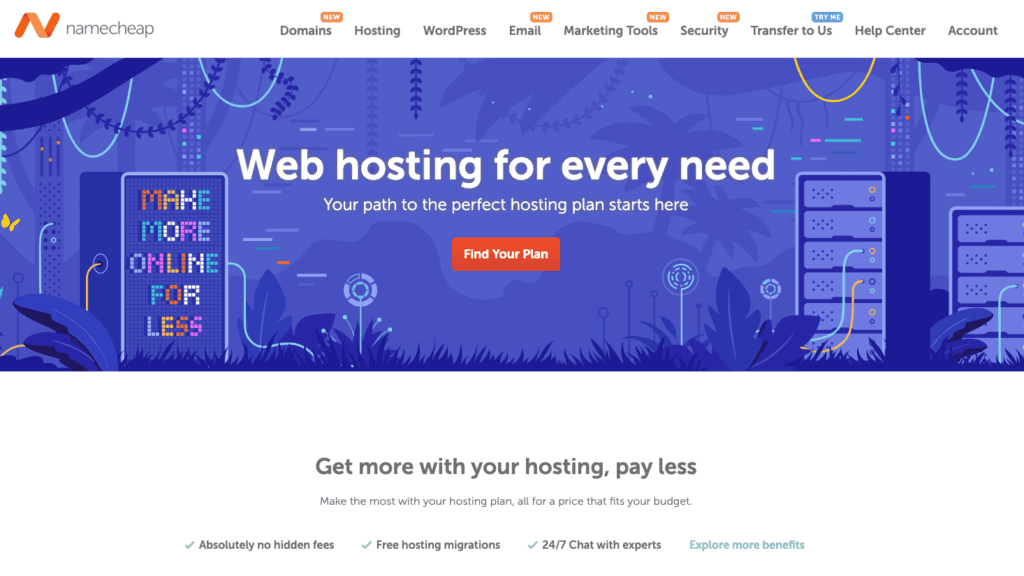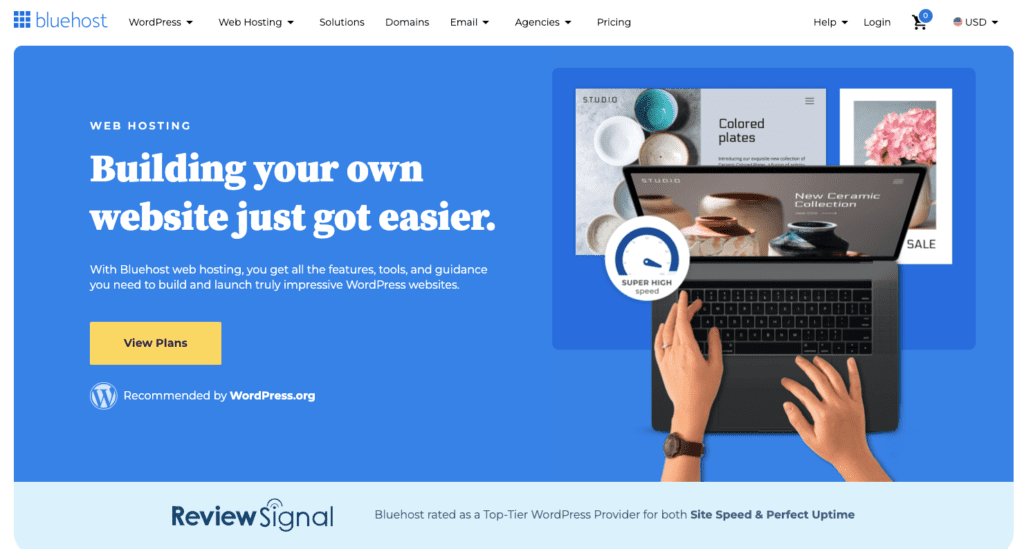Want to know how to choose ecommerce web hosting for your online store? Worry no more as I will help you choose the best hosting on the internet.
I will also share tips to find the perfect hosting solution that ensures your site runs smoothly and securely.
Selecting the right web hosting for your ecommerce site isn’t just about finding a place to store your website files. It’s also about ensuring your store is fast, reliable, and secure enough to keep your customers happy.
The right web hosting is great for high traffic and protecting sensitive payment information. Your website hosting is also important for your business’s success and sales.
In this post, I’ll walk you through how to choose ecommerce web hosting that fits your needs and budget. If you’re launching your first store or upgrading to handle more sales then you should definitely read till the end.
This post has all the details you need to make a smart decision. Let’s dive in!
Why Choosing the Right Ecommerce Web Hosting is Important
Would you stay on a website that takes forever to load? Probably not. Speed is the most important thing for ecommerce stores because every second counts when customers are shopping.
Fast websites provide a better experience. They ensure a smooth experience when people are browsing and buying.
Reliability is also important. Imagine your store going offline during a sale or a busy shopping season. That’s lost revenue and frustrated customers who might never return.
That’s why you need to choose hosting with strong uptime guarantees. They will always keep your store open for business.
And let’s not forget security. You’re handling sensitive customer data with ecommerce. Such as payment information.
A secure hosting solution protects your business from hacks, fraud, and data breaches. It also your customers safe and your reputation intact.

What Is Ecommerce Web Hosting?
Ecommerce web hosting is a type of hosting designed specifically for online stores. It includes features that are essential for selling products online.
These features include built-in tools for processing payments, SSL certificates for secure transactions, and scalability to handle surges in traffic.
For example, hosting for ecommerce supports platforms like Shopify, WooCommerce, or Magento. These hostings also make it easy to manage your inventory, orders, and customer interactions.
Ecommerce hosting gives you the tools and stability to operate a successful online store.
Why Choosing the Right Ecommerce Web Hosting Matters
- Uptime and Reliability
Your customers expect your store to be available 24/7. A good hosting provider with a 99.9% uptime guarantee ensures minimal downtime. This way you won’t miss out on sales opportunities. - Customer Experience
Hosting affects everything from page load speed to how smoothly your site functions. A fast and reliable host has a better experience for your visitors. This helps to convert more sales. - SEO Impact
Did you know your hosting can impact your search engine rankings? Google rewards fast and reliable sites.That’s why you should choose a good web hosting service. It will help your store appear higher in search results.
Key Factors to Consider When Choosing Ecommerce Web Hosting
Focus on the features that directly impact your business when you’re figuring out how to choose ecommerce web hosting. Let’s dive into the key factors.
Performance and Speed
Page load time is everything in ecommerce. Research shows that many visitors will leave if your site takes more than three seconds to load. Look for hosting providers that offer:
- CDNs (Content Delivery Networks): CDNs help speed up loading times by serving content from servers closer to your customers.
- SSD Storage: Solid State Drives (SSD) load data faster than traditional hard drives.
Google also considers site speed as part of its Core Web Vitals ranking factors. This means faster hosting can give you an SEO boost.
Scalability
Your website traffic grows with your business. That’s why you need to choose an eCommerce web host that can scale with you.
Cloud hosting solutions are a great example. They let you increase server resources during peak times like Black Friday.
Shared hosting is also great when you’re just starting. As you expand you’ll need VPS or dedicated hosting for better performance.
Security
Your customers need to feel safe when shopping on your site. A good ecommerce web hosting will provide:
- SSL Certificates: SSL certificates help to encrypt data to secure transactions.
- Firewalls and DDoS Protection: Good eCommerce web hosting with Firewalls and DDoS Protection locks cyberattacks.
- PCI Compliance: PCI Compliance ensures your site meets payment security standards.
You risk losing customer trust and even facing legal issues without these features.
Support and Customer Service
Ecommerce never sleeps. That’s why you need hosting support that is available 24/7. So that if there’s a server crash or a technical glitch you will have a knowledgeable support team to save the day.
You should look for hosting providers with multiple support options. They must have live chat, phone, and email. You should also check customer reviews to understand the quality of their support.
Ease of Use
If you’re not tech-savvy then you should choose an eCommerce web hosting with a detailed dashboard. Managed hosting solutions take care of the technical stuff for you. This way you can focus on running your business.
On the other hand, unmanaged hosting gives you full control but requires technical expertise. It’s great for developers or businesses with IT teams.
Pricing and Value
It’s tempting to go for the cheapest hosting. But you should remember that you get what you pay for. Look beyond the price tag and evaluate what’s included:
- Bandwidth limits
- Add-on costs for SSL certificates or backups
- Scalability options
The goal is to find a balance between cost and features that meet your business needs.
Now you know what to look for in an eCommerce web hosting. It’s time to explore the different hosting types available.
Up next I’ll break down the pros and cons of each option such as shared hosting and cloud hosting. So that you can choose the best website hosting for your ecommerce store. Keep reading!
Types of Hosting for Ecommerce Websites
Not all hosting is created equal. You need to understand the different types of website hosting. This will help you decide which one is best for your online store. Here’s a breakdown of the main eCommerce web hosting types:
Shared Hosting
Shared hosting is like sharing an apartment. Your site shares server resources with other websites.
- Pros of Shared Hosting: It’s budget-friendly and beginner-friendly. If you’re just starting with a small store and low traffic then you should use shared eCommerce website hosting.
- Cons of Shared Hosting: You might face limited resources and slower speeds on shared web hosting. This can happen during traffic spikes. It’s not ideal for growing or high-traffic online stores.
Check out this post to know more about shared hosting and its limitations.
Virtual Private Server (VPS) Hosting
VPS hosting gives you full control of a web server. It also has more resources than shared hosting.
- Pros VPS Hosting: You get better performance and more customization options with VPS hosting. It’s great for medium-sized stores with steady traffic.
- Cons VPS Hosting: It requires some technical knowledge to set up and manage. Also VPS hosts are really costly.
If you’re considering VPS hosting then check this VPS vs. shared hosting comparison.
Dedicated Hosting
Dedicated hosting is like having your own house. You get an entire server dedicated to your site.
- Pros of Dedicated Hosting: Full control and top-notch performance make dedicated hosting a great choice for large and high-traffic eCommerce stores.
- Cons of Dedicated Hosting: Dedicated hosting is expensive. It also requires maintenance either by you or a hired expert.
Read more about the benefits of dedicated hosting.
Cloud Hosting
Cloud hosting spreads your website across multiple servers. Also, it is highly scalable and flexible.
- Pros of Cloud Hosting: Cloud hosting is great for handling traffic surges and offers strong reliability.
- Cons of Cloud Hosting: Beginners might find the setup and management process of cloud hosting difficult.
For more details, read this post for cloud hosting features and benefits.
Managed Ecommerce Hosting
Managed hosting is perfect if you want a hands-off solution. The hosting provider takes care of server management, security, and updates for you.
- Pros of Managed Ecommerce Hosting: Managed ecommerce hosting has built-in features like backups and security.
- Cons of Managed Ecommerce Hosting: Managed ecommerce hosting comes at a higher price but can save you time and stress.
If you’re curious, this video of managed hosting explanation dives deeper into its benefits.
Comparing Popular Ecommerce Hosting Providers
Choosing the right hosting provider is essential when deciding how to choose ecommerce web hosting for your store. Let’s explore some of the top website hosting in the market. All of them have unique features for different businesses.
1. Namecheap
Namecheap is one of the most popular and budget-friendly Ecommerce web hosting providers. They offer reliable features for ecommerce websites. It’s a great choice for small businesses and startups.

- Features:
Namecheap provides hosting plans that include various website tools, SSL certificates. domain name registration, and easy app integrations. This includes CMS like WordPress and ecommerce platforms like WooCommerce and Magento.
Their hosting plans also offer solid uptime and good performance for the price. They also have user-friendly dashboards.
- Best for:
Namecheap web hosting is best for small businesses or entrepreneurs. If you are looking for the best eCommerce web hosting at an affordable price then you should definitely go for Namecheap. They have all the essential features for running an online store.
Learn more about Namecheap’s ecommerce hosting plans.
2. Bluehost (WooCommerce Hosting)
Bluehost is another top choice for ecommerce businesses built on WordPress. This is also great for those using WooCommerce for their eCommerce stores.

- Features:
Bluehost’s WooCommerce plans include one-click installs, SSL certificates, and pre-installed WooCommerce plugins. It also offers scalability.
You can easily upgrade your hosting as your business grows. Their servers are also optimized for WordPress. They are great for their fast performance and reliability.
- Best for:
Bluehost is great for WordPress users who want a hosting provider for ecommerce stores. They have tools that make setup and management easy.
Explore Bluehost WooCommerce hosting plans to see if it’s the right fit for your needs.
3. SiteGround
SiteGround is popular for its speed, reliability, and top-notch customer support. They are a solid option for eCommerce hosting.
- Features:
You get fast servers, automatic updates, daily backups, and excellent customer service with SiteGround. It also includes advanced features like staging tools and optimized caching for faster page loads.
- Best for:
SiteGround is best for store owners who want a dependable hosting provider. They have a balanced affordability and premium service.
Check out this SiteGround customer reviews and eCommerce hosting plans to see why it’s a favorite among ecommerce businesses.
4. AWS (Amazon Web Services)
AWS provides enterprise-grade eCommerce web hosting. They are unmatched for scalability and customization options.
- Features:
AWS is ideal for large businesses and tech-savvy teams. It also offers tools to scale resources dynamically based on traffic. This ensures high performance during peak times. You also get enhanced security and a global infrastructure for reliable uptime with AWS.
- Best for:
AWS is best for large enterprises or ecommerce businesses with technical expertise. Also good for a powerful and customizable hosting solution.
Learn more about AWS for ecommerce hosting.
5. Shopify Hosting
Shopify is another most popular platform for ecommerce hosting. They are great for beginners and small to medium-sized stores.
- Features:
Shopify simplifies ecommerce by bundling hosting, payment processing, and a user-friendly interface in one package. It also includes built-in SSL certificates for security and tools to customize your store. This web hosting offers fast loading speeds and a global Content Delivery Network (CDN).
- Best for:
Shopify eCommerce web hosting is best for beginners and small business owners. If you want a hassle-free way to launch and manage an online store then definitely go for Shopify hosting.
If you’re looking for an all-in-one ecommerce solution then check out Shopify’s hosting features.
How to Assess Your Ecommerce Hosting Needs
Take some time to evaluate your requirements before choosing a hosting provider.
1. Evaluate Your Website Traffic
You should estimate how much traffic your site currently gets and how much it might grow in the future. High-traffic sites need better hosting like VPS, cloud, or dedicated servers.
2. Consider Your Ecommerce Platform
Your hosting must be compatible with the platform you’re using. It should be compatible with Shopify, WooCommerce, Magento, or others.
For example, WooCommerce sites work best with WordPress-optimized hosting like Bluehost and SiteGround.
3. Budget and Growth Plans
Decide how much you’re willing to spend on hosting and factor in your long-term growth. Shared hosting is affordable but it might not be enough as your store scales up.
4. Check Reviews and Testimonials
Read user reviews to get a sense of a hosting provider’s reliability, performance, and customer support. Because real-life experiences can reveal details that marketing pages don’t.
Common Mistakes to Avoid When Choosing Ecommerce Web Hosting
1. Ignoring Uptime Guarantees
Downtime can cost you sales. You should always choose a host with at least a 99.9% uptime guarantee to keep your store online.
2. Choosing Based Solely on Price
Cheap hosting might save you money upfront but could lead to issues like slow speeds or poor support. Choose a hosting that has a balance of pricing with quality.
3. Overlooking Support Quality
Good customer support is essential for ecommerce websites. You should avoid hosts with limited or unresponsive support options.
4. Not Planning for Growth
Pick an eCommerce web hosting that can scale with your business. If you outgrow shared hosting then you should have an easy upgrade option to VPS or cloud hosting. This will make eCommerce website migration easy for you.
Tips for Migrating to a New Ecommerce Host
If you’re switching website hosts then here’s how to do it smoothly:
1. Pre-Migration Checklist
Backup all your website files and ensure the new web hosting is compatible with your ecommerce platform.
2. Testing Before Going Live
Test your site’s functionality after migrating. Also test payment processing and product pages before making it live.
3. Minimizing Downtime
Plan the migration during off-peak hours and notify your customers if there’s expected downtime. Many hosts offer free migration services. You can take advantage of that.
Conclusion
The right ecommerce web hosting is the most important step toward your online store’s success. You should understand your needs, explore hosting types, and avoid common pitfalls. This way you’ll find reliable, fast, and secure eCommerce web hosting.
Ready to make your choice? Then start by exploring some of the hosting providers I mentioned above. Your perfect ecommerce hosting is just a click away!
FAQs for “How to Choose Ecommerce Web Hosting”
Which type of hosting is best for an ecommerce website?
Cloud hosting is best for scalability. On the other hand VPS and dedicated hosting offer better control and performance. Managed hosting is also great for convenience.
How can I choose a web host?
Look for fast speeds, strong security, 24/7 support, and good reviews. Match the host to your ecommerce platform and budget.
Which domain is best for an ecommerce website?
Use a short, memorable .com domain. You can also get a country-specific domain if targeting a local audience.
Do I need a dedicated server for my ecommerce website?
Only if you have high traffic or need top performance. VPS or managed hosting works well for smaller stores.
Why is uptime important when choosing ecommerce hosting?
High uptime ensures your store stays online. This prevents lost sales and maintains SEO rankings.
What security features should I look for in ecommerce hosting?
Look for SSL certificates, PCI compliance, backups, firewalls, and DDoS protection.
How much bandwidth does an ecommerce website need?
It depends on traffic and content. But scalable plans are best to handle growth.
Can I switch hosting providers later?
Yes, just back up your site before switching. You can also get from a developer or the hosting support for migrations.
Is managed ecommerce hosting worth the extra cost?
Yes, if you want expert support and less maintenance hassle.
How does hosting impact my website’s speed and SEO?
Fast hosting improves load times, user experience, and search engine rankings.
